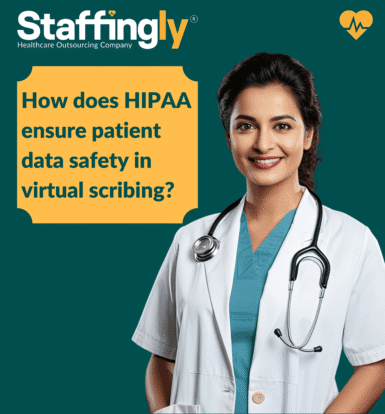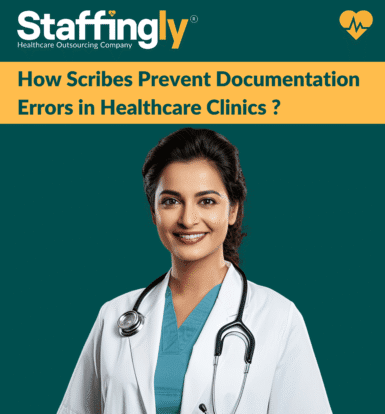On-Demand Outsourcing BPO Services for Healthcare Providers With 24/7 Coverage!
Save up to 70% on staffing costs!
Browse Specialty Staffing Services
The Hidden Burnout Crisis in Medical Front Offices
Burnout Nobody Talks About When people hear “healthcare burnout,” they usually think of doctors and nurses. But there’s another group quietly burning out every day: the front office staff. These are the people who answer phones, schedule patients, process referrals, wrangle insurance, manage check-ins, and keep the entire clinic moving. They don’t get the headlines. But without them, the clinic stops functioning. “People think front desk is easy. It’s actually chaos with a smile.” The burnout crisis isn’t just in

How do scribes protect patient info during EMR documentation?
Patients notice what’s typed, what’s repeated aloud, and who is present in the room. When a medical scribe is part of a visit, in-person or remote, the unspoken question often is: Is my information safe? 💬 “I love that my doctor focuses on me, but who is that person typing, and what do they see?” Scribes help clinicians focus on patients while ensuring accurate documentation. Protecting privacy is essential to maintaining trust, and with the right practices, patient information remains

How does HIPAA ensure patient data safety in virtual scribing?
Virtual medical scribes are transforming the healthcare industry by joining patient visits from secure locations to capture notes, orders, and codes. This technology allows healthcare providers to focus more on patient care instead of administrative tasks. But the primary concern for clinics remains: Is patient data safe? 💬 “If a scribe isn’t onsite, how do we ensure nothing leaks?” This guide breaks down how HIPAA protects patient health information (PHI) in virtual scribing and the essential controls healthcare providers should

How Can EHR-Triggered Coding Improve Accuracy, Compliance, and HIPAA Security in Medical Coding?
Medical coding plays a pivotal role in healthcare revenue and compliance, but it’s also fraught with challenges. Errors, denials, and security risks often arise from inaccurate coding, and a single mistake can cost thousands in lost revenue or trigger a compliance audit. EHR-triggered coding, integrated with medical scribing, is revolutionizing this process. By leveraging real-time data from Electronic Health Records (EHRs), this technology ensures accurate coding, streamlines compliance, and safeguards patient data under HIPAA. 💬 “A coding error delayed our

How Scribes Prevent Documentation Errors in Healthcare Clinics ?
In healthcare, a single documentation error can lead to denied claims, delayed care, or even compliance violations. These errors don’t just cost clinics revenue—they also erode patient trust and hinder operational efficiency. Medical scribes play a crucial role in addressing this issue. By handling real-time documentation with precision, scribes ensure accurate records, compliance with regulations, and improved clinic workflows, allowing physicians to focus on patient care instead of administrative tasks. 💬 “A coding error in one chart cost us $5,000

How Prior Authorizations Break Clinics And How to Finally Fix Them?
The Two Words Every Clinic Dreads Ask any receptionist, nurse, or office manager what ruins their day, and you’ll hear it: prior authorizations. On paper, they’re just an insurance safeguard. In reality, they’re the reason patients wait weeks for treatment, staff spend hours on hold, and doctors lose patience with paperwork instead of focusing on care. “I’ve spent entire afternoons on hold with insurance companies.” Prior auths were supposed to keep costs in check. Instead, they’ve become one of the

How Medical Coding Audits Prevent Revenue Loss and Ensure HIPAA Compliance in healthcare?
Medical coding audits are essential for maintaining the financial health of healthcare practices. These audits not only help detect coding errors early but also ensure compliance with HIPAA regulations, preventing revenue loss, delayed reimbursements, and compliance violations. Inaccurate coding can lead to significant financial setbacks, including denied claims and underpayments, so regular audits are crucial for sustaining the revenue cycle. 💬 “Our practice improved our cash flow and compliance after implementing regular coding audits.” These audits ensure that medical codes

The Evolution of Medical Coding: Adapting to New Technologies
Medical coding has become an essential part of healthcare revenue management and compliance, yet it continues to be a challenge for many healthcare providers. The industry is undergoing a transformation as new technologies, such as AI, machine learning, and automation, revolutionize how medical coding is done. These tools help clinics improve accuracy, reduce claim denials, and maintain compliance with ever-changing regulations, ultimately improving the revenue cycle. 💬 “Medical coding used to be a paper-based task. Now, it’s all about data
 Book a Demo to Build Your Team Today!
Book a Demo to Build Your Team Today!


 Read Case Studies
Read Case Studies 



 Virtual Medical Assistants
Virtual Medical Assistants



